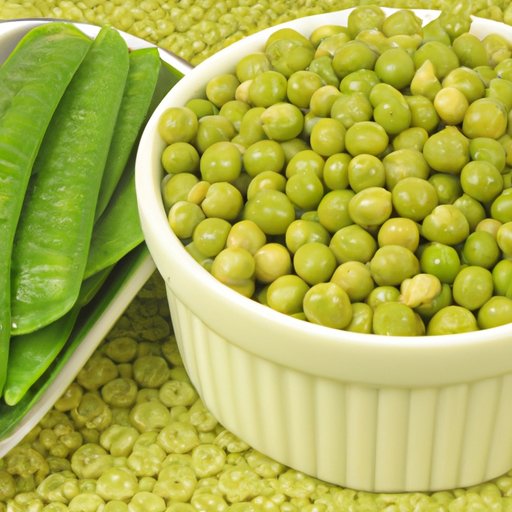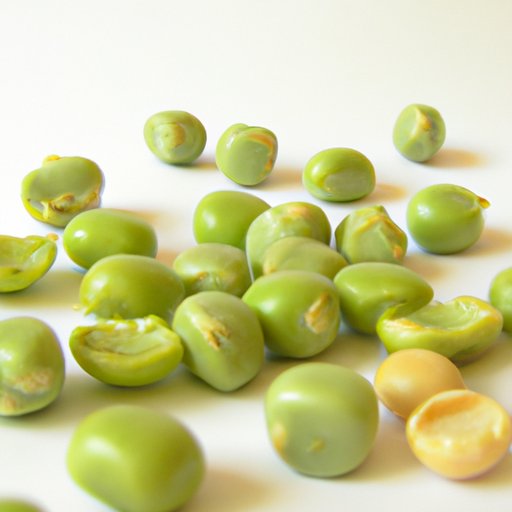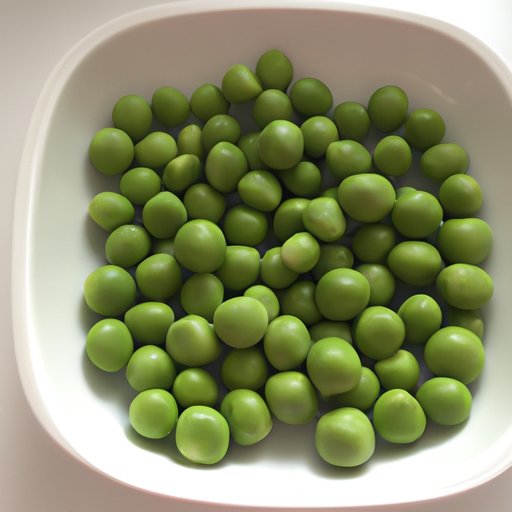Introduction
Peas are small green legumes that have been a part of human diets for centuries. They are an excellent source of protein, fiber, vitamins, and minerals, making them a nutrient-packed superfood. In this article, we will explore the nutritional benefits of peas and discover why they should be part of your diet.

Exploring the Nutritional Benefits of Peas
When it comes to nutrition, peas are a powerhouse. They are packed with essential nutrients that can provide numerous health benefits. Here is a closer look at some of the key nutritional components of peas.
Protein Content
Peas are a great source of plant-based protein. One cup of cooked peas contains 8 grams of protein, which is about the same amount as one egg or two tablespoons of peanut butter. Protein helps build strong muscles and is an important component of a healthy diet.
Fiber Content
Peas are also a good source of dietary fiber. Fiber helps keep you full longer and aids in digestion. One cup of cooked peas provides 6.6 grams of fiber, which is about one-quarter of the recommended daily intake for adults.
Vitamin and Mineral Content
Peas are also rich in vitamins and minerals. They are particularly high in vitamin A, vitamin C, folate, and iron. Vitamin A is important for vision and immune system health, vitamin C helps protect against cell damage and boosts immunity, folate is essential for cellular growth and development, and iron helps transport oxygen throughout the body.
Peas: A Nutrient-Packed Superfood
The combination of protein, fiber, vitamins, and minerals makes peas a nutrient-packed superfood. Eating peas can provide numerous health benefits that can help improve overall wellbeing.
Potential Health Benefits
Eating a diet rich in peas has been linked to a number of potential health benefits. Studies have shown that eating peas can help lower cholesterol levels, reduce the risk of heart disease, and even aid in weight loss. Peas are also a good source of antioxidants, which can help protect against cancer and other diseases.
How Eating Peas Can Help Improve Your Health
In addition to the potential health benefits mentioned above, eating peas can also help improve your overall health. Peas are low in calories and fat, making them a great addition to any weight loss plan. They are also high in fiber, which can help keep you feeling fuller for longer and regulate blood sugar levels. Eating peas can also help boost your immune system and provide your body with essential vitamins and minerals.
Discovering the Hidden Health Benefits of Peas
While peas are already a nutrient-packed superfood, they contain even more hidden health benefits. Peas are rich in antioxidants, which can help protect against free radical damage and reduce inflammation. They are also high in phytonutrients, which are compounds found in plants that can help fight off disease and promote overall health.
Antioxidants
Antioxidants are compounds found in food that help neutralize free radicals, which are unstable molecules that can cause cell damage. Peas are a great source of antioxidants, including carotenoids, phenolic acids, and flavonoids. These antioxidants can help protect against cell damage and reduce inflammation.
Phytonutrients
Phytonutrients are compounds found in plants that can help fight off disease and promote overall health. Peas are rich in phytonutrients, including lignans, saponins, and phytic acid. These phytonutrients can help reduce the risk of certain cancers, improve digestion, and boost the immune system.

The Surprising Nutritional Profile of Peas
In addition to the protein, fiber, vitamins, minerals, antioxidants, and phytonutrients mentioned above, peas also contain a variety of other nutrients. Let’s take a closer look at the macronutrients and micronutrients found in peas.
Macronutrients
Peas are a great source of macronutrients, including carbohydrates, protein, and fat. One cup of cooked peas contains 16 grams of carbohydrates, 8 grams of protein, and 0.4 grams of fat. These macronutrients provide energy and help keep you feeling full for longer.
Micronutrients
Peas also contain a variety of micronutrients, including vitamins and minerals. Some of the most abundant micronutrients in peas include vitamin A, vitamin C, folate, and iron. These micronutrients are essential for maintaining good health and can help boost the immune system.

What You Need to Know About the Nutrients in Peas
When it comes to nutrition, it’s important to know what you’re getting. Here is some key information you need to know about the nutrients in peas.
Serving Size
The recommended serving size for peas is 1/2 cup (about 70 grams). This serving size contains 80 calories, 16 grams of carbohydrates, 8 grams of protein, 0.4 grams of fat, 6.6 grams of fiber, and a variety of vitamins and minerals.
Calorie Content
One cup of cooked peas contains 80 calories, making them a great addition to any weight loss plan. They are low in fat and high in fiber, which can help keep you feeling full for longer.
Conclusion
Peas are a nutrient-packed superfood that can provide numerous health benefits. They are a great source of plant-based protein, fiber, vitamins, and minerals. They are also rich in antioxidants and phytonutrients, which can help protect against cell damage and reduce inflammation. Eating a diet rich in peas can help improve overall health and wellbeing. So, next time you’re looking for a nutritious snack or side dish, reach for the peas!
Summary of Nutritional Benefits
Peas are an excellent source of protein, fiber, vitamins, minerals, antioxidants, and phytonutrients. Eating a diet rich in peas can help lower cholesterol levels, reduce the risk of heart disease, aid in weight loss, and protect against cell damage and disease. Peas are also low in calories and fat, making them a great addition to any weight loss plan.
Recommendations for Eating Peas
When it comes to eating peas, the recommended serving size is 1/2 cup per day. This serving size contains 80 calories, 16 grams of carbohydrates, 8 grams of protein, 0.4 grams of fat, 6.6 grams of fiber, and a variety of vitamins and minerals. Peas can be eaten raw, cooked, or added to salads, soups, and stir-fries.
(Note: Is this article not meeting your expectations? Do you have knowledge or insights to share? Unlock new opportunities and expand your reach by joining our authors team. Click Registration to join us and share your expertise with our readers.)
